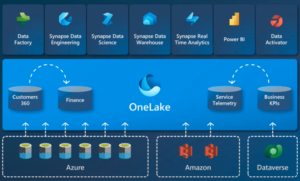
Microsoft Fabric is a comprehensive data platform designed to streamline data integration, management, and analytics. As organizations increasingly seek to harness their data for strategic decision-making, the demand for professionals skilled in Microsoft Fabric is growing. This article explores the uses of Microsoft Fabric, its key features, industries where it is in high demand, the roles and responsibilities of a Microsoft Fabric expert, salary expectations, necessary certifications, and essential skills.
Uses of Microsoft Fabric
Microsoft Fabric serves various purposes, including:
- Data Integration: Seamlessly connecting data from diverse sources to create a unified view for analysis.
- Data Engineering: Facilitating data preparation and transformation for analytical needs.
- Data Warehousing: Providing robust solutions for storing and managing large volumes of structured and unstructured data.
- Real-Time Analytics: Enabling organizations to analyze data in real time, facilitating timely insights and decisions.
- Collaboration: Promoting data sharing and collaboration across teams and departments.
Key Features of Microsoft Fabric
- Unified Platform: Microsoft Fabric integrates various data services, including data lakes, warehouses, and analytics tools, into a single platform.
- Dataflow Capabilities: Users can design and manage dataflows to automate data integration and transformation processes.
- Built-in AI and Machine Learning: The platform incorporates AI capabilities, allowing users to generate insights and predictions from their data effortlessly.
- Seamless Connectivity: Microsoft Fabric connects to numerous data sources, including cloud services, on-premises databases, and third-party applications.
- Robust Security Features: Enhanced security measures ensure that data is protected throughout its lifecycle.
Demanding Industries
Microsoft Fabric is increasingly utilized across various sectors, including:
- Information Technology: IT companies leverage Microsoft Fabric for data management, analytics, and cloud integration.
- Finance: Financial institutions use the platform to manage data for compliance, risk assessment, and financial reporting.
- Healthcare: Healthcare organizations rely on Microsoft Fabric to integrate patient data, streamline operations, and improve patient outcomes.
- Retail: Retailers analyze customer behavior, inventory levels, and sales trends to optimize operations and enhance customer experience.
- Manufacturing: Manufacturers utilize the platform for supply chain management, production analytics, and quality control.
Roles and Responsibilities of a Microsoft Fabric Expert
A Microsoft Fabric expert, whether a consultant or developer, typically has the following roles and responsibilities:
- Data Integration: Designing and implementing data integration solutions to unify data from multiple sources.
- Data Modeling: Creating efficient data models that support analytical needs and reporting requirements.
- Analytics Development: Developing analytics solutions that provide actionable insights and support decision-making.
- Collaboration: Working closely with stakeholders to understand their data needs and align solutions with business objectives.
- Training and Support: Providing training to users and supporting them in using Microsoft Fabric effectively.
Salary Expectations
Salaries for Microsoft Fabric experts can vary based on role, experience, and industry:
- Microsoft Fabric Developer:
- Entry-Level: $80,000 – $100,000
- Mid-Level: $100,000 – $130,000
- Senior-Level: $130,000 – $160,000+
- Microsoft Fabric Consultant:
- Entry-Level: $85,000 – $105,000
- Mid-Level: $105,000 – $135,000
- Senior-Level: $135,000 – $170,000+
- Data Engineer with Microsoft Fabric Skills:
- Entry-Level: $75,000 – $95,000
- Mid-Level: $95,000 – $120,000
- Senior-Level: $120,000 – $150,000+
Certifications Required
To enhance credibility and demonstrate expertise, aspiring Microsoft Fabric professionals should consider obtaining relevant certifications:
- Microsoft Certified: Azure Data Engineer Associate: This certification validates skills in data storage and processing solutions using Azure.
- Microsoft Certified: Azure Solutions Architect Expert: This certification covers designing solutions that include Microsoft Fabric components.
- Microsoft Certified: Azure Data Scientist Associate: This certification focuses on applying machine learning and AI techniques, relevant for Microsoft Fabric users.
Additional Hard and Soft Skills
Hard Skills:
- Proficiency in data integration and transformation tools within Microsoft Fabric.
- Familiarity with Azure services and data architecture concepts.
- Experience with SQL for data querying and manipulation.
- Knowledge of machine learning algorithms and data analytics techniques.
Soft Skills:
- Problem-Solving: Strong analytical skills to identify data challenges and develop effective solutions.
- Communication: The ability to explain complex data concepts to non-technical stakeholders and collaborate effectively with teams.
- Adaptability: Staying current with Microsoft Fabric updates and evolving data management practices.
- Attention to Detail: Ensuring data accuracy and integrity in all analytical processes.
Conclusion
Microsoft Fabric is a pivotal tool for organizations aiming to unify their data solutions and enhance analytical capabilities. As the demand for skilled Microsoft Fabric professionals rises across various industries, those equipped with the right certifications and skills can find rewarding opportunities. By understanding the roles, responsibilities, and necessary qualifications, aspiring Microsoft Fabric consultants and developers can position themselves for success in this dynamic field.
“Unify Your Data, Amplify Your Insights: Master Microsoft Fabric for Seamless Analytics and Transformation!”



